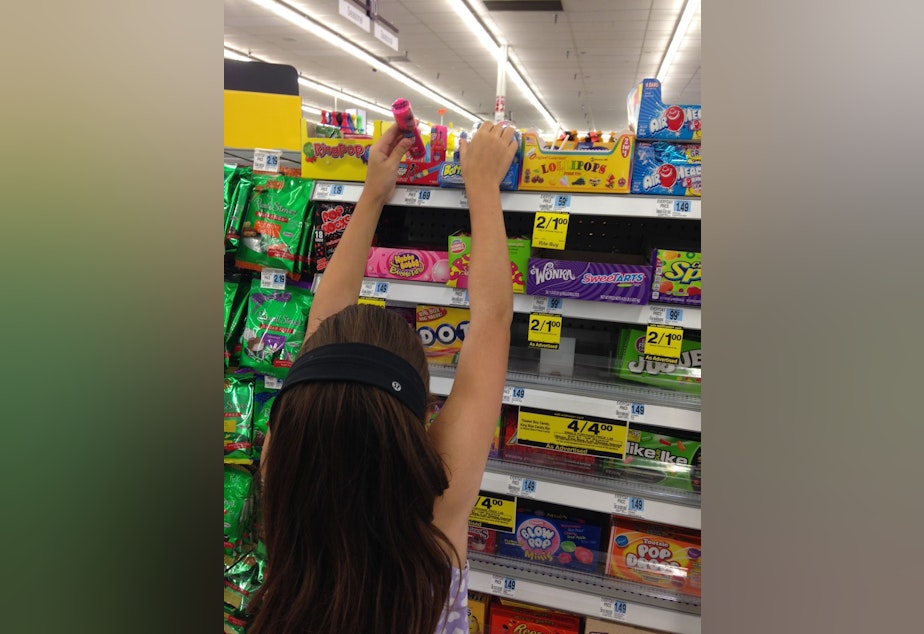Gourmet Marijuana Goodies Just Out Of Reach In Washington

State-licensed marijuana retail stores are just opening their doors in Washington and state regulators are still deciding what customers will find inside. Last month the Washington State Liquor Control Board told processors they will allow sweets, but not if they’re presented in a way that’s deemed "especially appealing to children."
I took my kids Grace and Dorothea and their friend Lara to the candy aisle at the local drugstore to see what that phrase actually means. Lara singled out Swedish Fish while Dorothea pronounced gummy snakes some of the more irresistible products for kids. Grace said kids are likely turned off by the plain labels on the store’s generic candy and more drawn to the colorful ones.
But they were unanimous on their favorite candy product: the Baby Bottle Pop. Lara explained the appeal. They're "lollipops and on the inside [of the bottle] is powder so you can suck it and then turn it inside out and get the powder.” Sort of candy and toy all in one.
State regulators are requiring processors to submit a photo of each product along with the labeling materials, so they’ll probably be on the lookout for products that resemble toys. Kid-oriented labels featuring cartoon characters are already banned. And WSLCB spokesman Brian Smith has mentioned cotton candy and Pixy Stix as products that are "especially appealing to kids."
But regulators say they aren’t ruling out whole categories of candy – they may allow some gummies or lollipops. It’s all in the way the products are presented.
Sponsored
Dr. Leslie Walker is chief of adolescent medicine at Seattle Children’s Hospital. She calls these rules a good start in preventing kids’ access to marijuana. But she says the hospital is seeing more kids admitted for accidentally ingesting it.
“It doesn’t even have to look particularly appealing to a toddler. You know, if you have it out and it’s on the table, kids are going to be at risk,” Walker said. She’d like to see more focus on education and enforcement, “so that kids actually can’t purchase it and people are actually checking that.”
State regulators note that they are limiting the total amount of THC that edibles can contain. They’re also banning foods deemed high-risk for food poisoning by the state Department of Agriculture, including anything that has to be kept hot or cold.
Some licensed marijuana processors have talked about creating marijuana-infused sorbets and other delicacies, but those products will have to remain on hold for now. A.C. Braddock is CEO of Eden Labs, which makes extraction systems for marijuana processors. She said these restrictions are a big disappointment for foodies and small business owners. “We’re a foodie town,” she said. “So the possibilities as far as pastries and drinks and ice cream and, I mean, the list would just go on and on. Restricting that for adult use is kind of restricting the industry.”
State regulators say they don’t rule out more marijuana-infused foods in the future. They say they’re trying to learn a lesson from Colorado’s experience, where some small producers of marijuana edibles had food safety issues when they ramped up to larger-scale production.
Sponsored
The restrictions aren’t stopping entrepreneurs from hatching new business ideas. Garyn Angel is founder and CEO of the firm Magical Butter. He said he hopes to open a marijuana food truck and restaurant in Seattle.
Meanwhile, all kinds of edibles will still be available at the state’s unregulated medical marijuana dispensaries. Dr. Walker at Children’s Hospital said the existence of those dispensaries remains a problem in terms of youth access. But Braddock said the small businesses that make these edibles are well-established and deserve a place in the new state-licensed stores.

